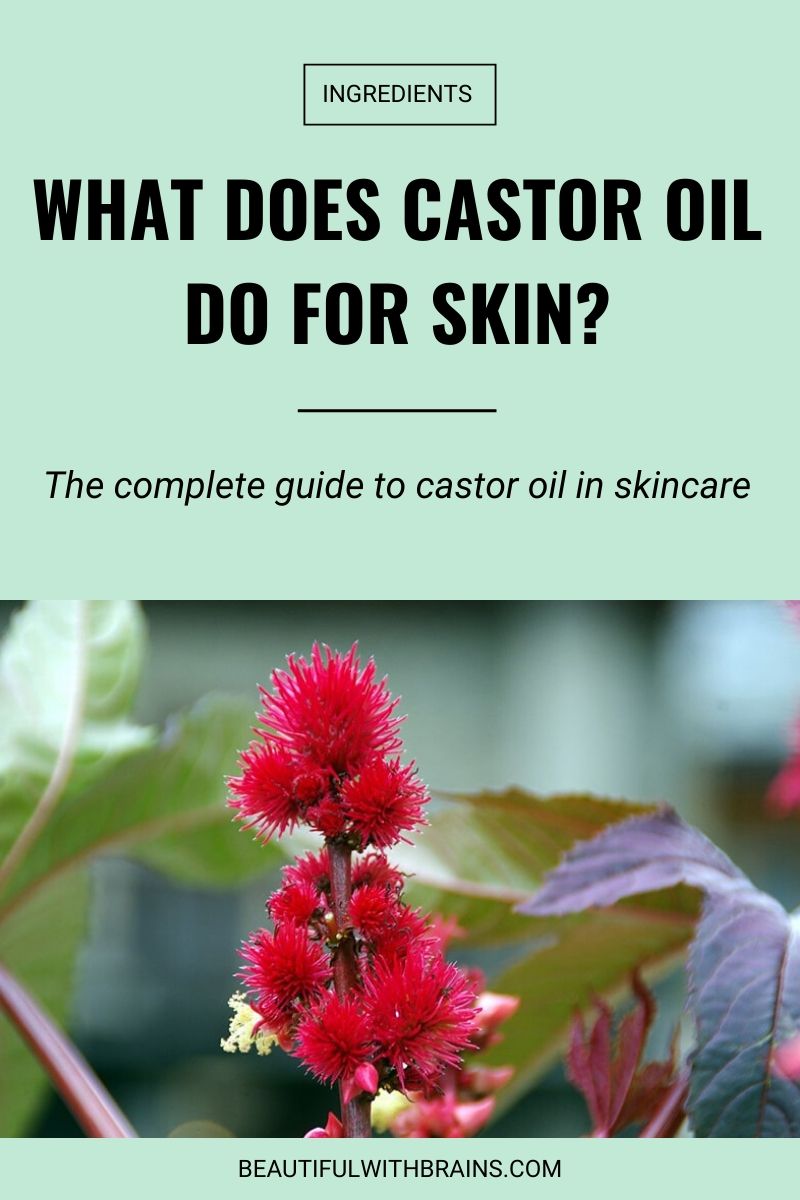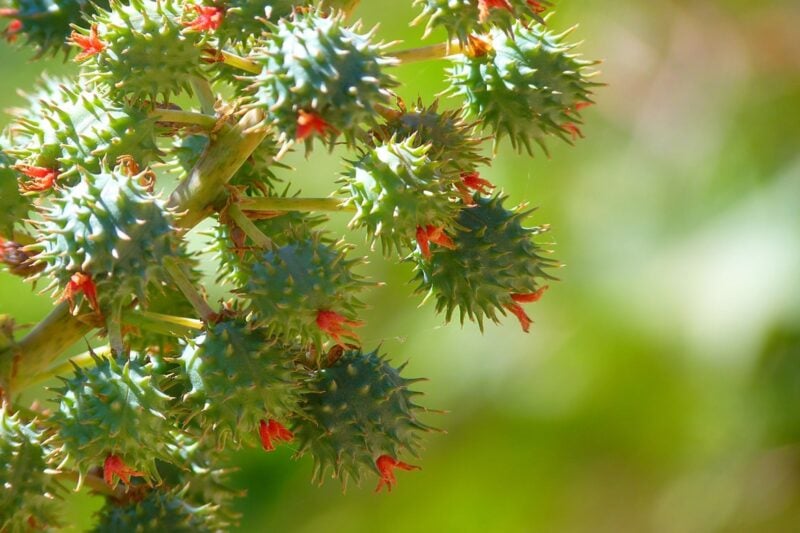
Is castor oil good for skin? This vegetable oil has a bit of a mixed rep. Used for centuries for its soothing and moisturising properties, it never got as popular as Argan or jojoba oils in the eyes of skincare fanatics. If you’re wondering why, I’ll reveal the mystery to you. Although its unique composition makes it very versatile, the texture is thick, greasy, and a downright pain to use.
Compare that to rose hip oil, which is much lightweight and has anti-aging properties to boot and you’ll see why castor oil isn’t always the first choice for brands to use. Yet, it’s a popular carrier oil that makes a good base for DIY (and ready-made) skincare products. Here’s everything you need to know about castor oil in skincare, including its benefits, uses, and “side effects”:
What Is Castor Oil?
Castor oil is the vegetable oil derived from the seeds of the Ricinus Communis, a thorny and tough shrub found in tropical climates such as Eastern Africa, India and the Mediterranean region. The seeds are cold-pressed to make a shiny, pale yellow oil. Like most oils, it’s loaded with moisturizing fatty acids. Ricinoleic Acid makes up a whooping 89% of the all the fatty acids in the oil.
It also also linoleic (4.2%), oleic (3.0%), stearic (1%), palmitic (1%), dihydroxystearic acid (0.7%), linolenic acid (0.3%), and eicosanoic acid (0.3%). These oils strengthen your skin’s protective barrier, so that moisture stays in and irritants stay out. For dry and sensitive skin, they’re an absolute must.
The catch? Castor oil IS sticky. It’s ok when used as a base in creams and lotions, but I wouldn’t use a bottle of pure organic castor oil and use that on my skin. Said that, it is a popular ingredients in many homemade skincare products – because it works. If the texture doesn’t put you off, this oil has plenty of benefits for your skin.
Castor Oil Benefits For Skin: What Does It Do?
Curious to hear about the benefits of castor oil for skin? Get ready, it is a multi-tasker that can be used in a variety of ways for lots of different purposes. Here’s everything castor oil does for skin:
- Anti-bacterial: The triglycerides in castor oil can help reduce the bad bacteria on your skin. It may even help reduce P. Acnes, the bacteria that gives you acne, but we need more research to be sure (the thick texture could clog pores).
- Anti-inflammatory: There are some reports it helps to soothe sensitive skin and relieve irritations. But, like board-certified dermatologist Morgan Rabach MD points out, “it has not been well tested or established.” The evidence here is still anecdotal.
- Cleansing: Like all oils, castor oil is a great cleanser and makeup remover. It works thanks to the “like attracts like” principle. It melts the oil in your makeup and sunscreen + excess sebum on your skin and takes them on a trip down the drain. I recommend you mix it with olive oil or another oil to reduce the sticky feel.
- Moisturising: Its fatty acids create a protective barrier on the skin that keeps moisture in. The more moisture your skin has, the softer and suppler it becomes. If your skin’s dry, castor oil helps to nurse it back to health. If it’s already soft and smooth, it keeps it that way. “The moisturizing effects are beneficial for chapped lips and super dry hands and feet in winter,” shares Dr Rabach.
- Penetration-enhancer: It helps active ingredients better penetrate your skin, so they can work better and faster.
- Skin-protectant: The fatty acids in castor oil create a protective barrier that keeps moisture in. Plus, it also keeps germs and bacteria out and helps skin better withstand the attacks of cold weather, sun exposure and pollution.
Related: How To Strengthen Your Skin’s Protective Barrier (And Why It Matters)

Does Castor Oil Has Any Side Effects?
FYI, I’m talking about topical side effects of castor oil here. Ingesting castor oil is a different story and can have a contracting effect on the uterus if you’re pregnant. If you’re thinking about getting supplements, consult your doctor first.
Now, back to the side effects of topical application of castor oil. The main one is the sticky feel. That should tell you how safe castor oil is. 😉 Said that, castor oil can cause irritations in some people, but this is rare (heck, there are people who are even allergic to water! Doesn’t mean that’s bad for everyone). By all means, do a patch test before using it. But, unless you’re allergic to it, there’s no reason not to use castor oil.
Does Castor Oil Cause Acne?
Good news: castor oil is very low on the comedogenicity scale, so it’s very unlikely to clog your pores and give you pimples. But, its sticky texture could still be problematic and aggravate acne in some people.
“If you have an oilier skin, use castor oil sparingly,” says facialist Chelsee Lewis. “Because of its anti-inflammatory properties, castor oil will take down redness in acne-prone skin. But it’s also a heavier oil so stick to using it once or twice a week to see how your skin reacts.”
Personally, I don’t recommend oils (including castor oil) to anyone with oily or acne-prone skin. The risk of a breakout may be low, but with your skin type, you never know.
Fungal acne? Don’t take the risk. Anything with fatty acids (and castor oil HAS fatty acids) will feed malassezia, the fungus that’s making your life miserable.
Translation: castor oil may be safe for bacterial acne, but it can aggravate fungal acne.
Related: How Do You Know You Have Fungal Acne And How Do You Deal With It?
How To Use It
You can go to a natural health shop, get a bottle of castor oil and slather it on your face. If you don’t mind the sticky texture, that’ll work. If you do mind (I do!), get a moisturiser or other skincare product with castor oil and use it as instructed.
I personally recommend pure castor oil only for cleansing, just because of the thick texture. Plus, it doesn’t have powerful anti-aging properties like organ or rose hip oils, so I don’t mind if it gets washed down the drain. I feel much worse “wasting” rose hip or argan oils for cleansing, know what I mean?
If you want to use castor oil for cleansing, I do recommend you mix it with other oils to dilute the stickiness. With its lightweight texture, jojoba is a great choice for oil. Sweet primrose oil is soothing, so it’s a good option for sensitive skin. Dry skin? You can pretty much have your pick of all the oils out there.
Who Should Use It?
Castor oil is most suitable for dry and sensitive skin. If your skin is dry, cracked, can’t retain moisture or easily irritated, castor oil can nourish it back to health, make it soft and supple again, and calm down redness and flareups.
How Often Can You Use It?
Again, we’re talking about skincare products here. As a moisturiser or cleanser, you can use it up to twice a day, provided you don’t find it too thick and greasy.
What Are The Best Skincare Products With Castor Oil?
- Aquaphor Lip Repair + Protect Broad Spectrum SPF 30 ($5.49): Loaded with castor oil and shea butter, this lip balm deeply moisturises skin and provides broad spectrum protection against UV rays at the same time. Available at iHerb and Ulta.
- Mario Badescu Healing & Soothing Mask ($20.00): A clay mask loaded with natural oils to soak up excess oil while moisturising skin at the same time. Zinc oxide is here as a skin protectant, to soothe troubled and cracked skin. Available at Beauty Bay, Cult Beauty, and Ulta.
- Even Tone Barrier Repair Ceramide Cream ($23.99): Ideal for dry and sensitive skin, this cream is loaded with ceramides, natural oils (including castor oil) and hyaluronic acid to moisturise even the driest of skin types. Available at Ulta.
- Pai Skincare Camellia & Rose Gentle Hydrating Cleanser ($50.00): A gentle, oil-based cleanser that removes stubborn makeup and impurities from skin without drying it out. Available at Content Beauty, Cult Beauty, and Free People.
Is Castor Oil Good For Skin?
Yes. Castor oil is a wonderful moisturiser that cleanses, soothes, and protects skin. It does it all! Just be careful if you use pure castor oil alone. It’s really sticky!

People are constantly asking us in my store if we sell this. We don’t, but it’s supposed to be very good to hair. Much like olive oil (not the cooking version) or sweet almond oil, you rub it into your hair, wear a showercap overnight, shower it off and it makes yer hair all soft and whatnot.
yes, castor oil is great for hair. It makes them all soft and silky. I also heard that it is supposed to make your hair grow faster but unfortunately that is not true.
hello! so this is 500 years later, but i figured i’d drop a word. from what i understand, castor oil coats the hair (doesn’t penetrate it like coconut oil) and because it’s so persistent, helps prevent damage, which results in better length. not much else can control the speed at which hair grows though! genetics and food play a huge part, and whatever else we do to keep it as damage free as possible while it grows.
Cat, that’s so true! Castor oil is a great moisturizer, but t doesn’t do miracles. Making hair grow faster is not as simple as coating your hair in castor oil, unfortunately!
Is castor oil carcingenic
Sandra: no, it isn’t.
Actual beautifulwithbrains. Castor oil does make your hair grow fast. I actually use it. My hair had grown an inch in 3 weeks. You should research it a little more.
Emily, thank you for your comment. I did research it and I couldn’t find any scientific studies that proved castor oil can make hair grow so, until then, I’ll remain sceptical. Anecdotal evidence is important too, but it is not as accurate because there are so many variables to consider. It may be that there are other factors that are contributing to your hair growth. Without a proper scientific test, we can’t know for sure. In any case, I’m glad castor oil works so well for you.
Castro oil is good for whats ails you. It does stimulate the hair and it does help it grow faster.
Claretha, thanks for your comment. I believe there is some anecdotal evidence that castor oil makes hair grow faster, but until I see a scientific study confirming it, I’ll remain sceptical. It’s still a wonderful and very beneficial oil though.
Why don’t you try it then
Emily, because at the moment, I’m not interested in making my hair grow faster. In fact, I’m thinking of cutting it! 🙂